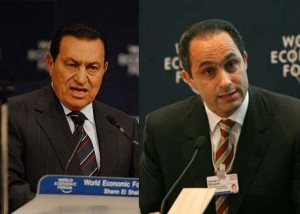 State TV reports that President Hosni Mubarak has resigned as head of Egypt’s ruling party.
State TV reports that President Hosni Mubarak has resigned as head of Egypt’s ruling party.
However, Mubarak still continues as the nation’s president.
His son, Gamal Mubarak, and the National Democratic Party’s secretary-general, Safwat el-Sharif, have also resigned from the party, in a new gesture to protesters carrying out a 12-day-old wave of anti-government demonstrations.
State TV said the ruling party’s six-member Steering Committee of the General Secretariat stepped down and was replaced. The council was the party’s highest decision-making body, and el-Sharif and other outgoing members were some of the most powerful (and to many Egyptians, unpopular) political figures in the regime.
 El-Sharif was replaced by Hossam Badrawi, member of the liberal wing of the party who had been sidelined within the NDP ranks in recent years because of his sharp criticisms of some policies.
El-Sharif was replaced by Hossam Badrawi, member of the liberal wing of the party who had been sidelined within the NDP ranks in recent years because of his sharp criticisms of some policies.
This comes as U.S. Secretary of State Hillary Clinton, speaking today at an international security conference in Munich, signaled that U.S. support has swung behind a transition headed by the recently-named vice president, Omar Suleiman.
“There are forces at work in any society, particularly one that is facing these kind of challenges, that will try to derail or overtake the process to pursue their own agenda, which is why I think it’s important to follow the transition process announced by the Egyptian government, actually headed by vice-president Omar Suleiman,” Clinton said.
Clinton went on to say the transition should be transparent and inclusive, while setting out “concrete steps”, moving towards orderly elections in September. She listed with approval the steps the Egyptian government had taken so far.
“President Mubarak has announced he will not stand for re-election, nor will his son,” Clinton said. “He has given a clear message to his government to lead and support this process of transition. That is what the government has said it is trying to do, that is what we are supporting, and hope to see it move as orderly but as expeditiously as possible under the circumstances.”
In a statement from the White House, spokesman Tommy Vietor said that Deputy National Security Advisor Denis McDonough convened a meeting on Egypt this morning, and that President Obama will be briefed on the situation by his senior national security staff this afternoon.
The new appointments to the NDP’s leadership were largely young figures, one of the replacements, Mohammed Kamal, told The Associated Press. “It’s a good change. It reflects the mood of change that is sweeping the country,” he said.
Gamal Mubarak, who was a member of the Steering Committee, was widely seen as being groomed by his father Hosni Mubarak to succeed him as president. But Vice President Omar Suleiman promised earlier in the week that Gamal would not run for president in elections due in September.
The younger Mubarak was also head of the party’s powerful policies committee, where for the past decade he led a campaign of economic liberalization. State TV said Gamal was also removed from that post and replaced by Badrawi.
The announcement was greeted with scorn by some of the tens of thousands of protesters gathered in Cairo’s Tahrir Square. Wael Khalil, a 45-year-old activist, said it would “reinforce their (protesters’) resolve and increase their confidence because it shows that they are winning, and the regime is retreating inch by inch.”
Plans calls for having free and open elections in September. Also appears the U.S. and other Egyptian officials are trying to find a way to ease Mubarak out of office.
There were reports earlier this morning that Suleiman and top military leaders were discussing way to limit President Hosni Mubarak’s powers, as a way to ease him out of control, Egyptian and American officials told The New York Times. A transitional government headed by Suleiman would then negotiate with the opposition movement on devising and implementing democratic reforms.
Protest leaders have also met with the country’s prime minister, but it is unclear what progress may have been made in those meetings.
Al Jazeera reported that Prime Minister Ahmed Shafiq was prepared to listen to any and all demands made by the demonstrators, except for Mubarak’s early departure.
Shafiq told state TV that Friday’s 100,000-strong demonstration, referred to by protesters as a “Day fo Departure,” failed to force Mubarak out. “We haven’t been affected, and God willing next Friday we won’t be affected,” he said. “All this leads to stability.”
On Saturday. The Associated Press reports Mubarak met with his top economic officials to discuss steps for getting the economy restarted. The Egyptian economy has suffered an estimated $3.1 billion in losses since the protests began.
Opposition leaders have called for another million-man protest for Sunday. In honor of those who have been killed during the 11 days of protests, it’s being referred to as “Martyrs’ Sunday.”
The Egyptian military on Saturday came up against angry pro-democracy protesters in an attempt to persuade them to move burnt cars and human barricades from the streets leading to Tahrir Square in downtown Cairo, where thousands continued to call for President Hosni Mubarak’s departure.
The protesters set up human barricades around Tahrir, or Liberation, Square to prevent pro-Mubarak supporters from disrupting their pro-democracy demonstrations.
Fierce clashes between pro- and anti-Mubarak supporters earlier in the week left at least 11 killed and hundreds injured. CBS

Leave a Reply
You must be logged in to post a comment.